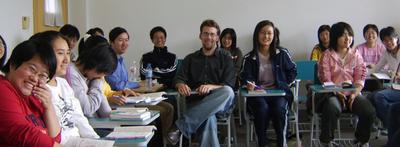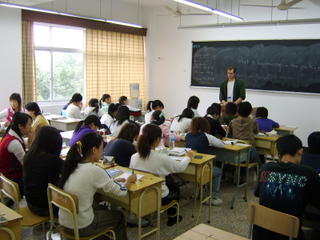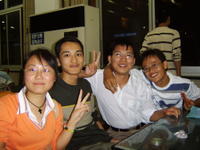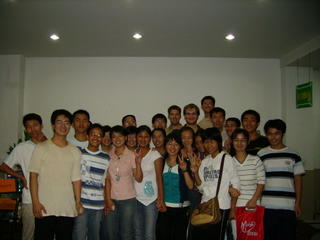Monday, October 17, 2005
Between Cocktails...
 Well, I just received an email from my parents; they said they've read my posts and are surprised by how much of my time I spend drinking cocktails. So I suppose I should say a word or two about what I am doing here when I am not on the sauce, which I can assure you (Mom and Dad) is not as often as these stories may make it seem. I am teaching 16 hours of class a week. Each class period is 90 minutes long, which is forever. I teach two sophomore classes about the culture and history of English-speaking countries. So far we have only discussed England--we don't get to the US until next semester. These are my most challenging classes since I have to prepare a 90-minute lecture each week. One class period usually takes between three to five hours to prepare for. It's quite difficult since I am teaching complex ideas to students who have the vocabulary of second graders (at best). Today I tried to explain the intricacies of the British economy. I don't think it was much of a success. Next week they have a test on the first five chapters, so I will get to see how well I've really done. I remember when I had to do class presentations back in school and I would get half the semester to prepare for it, and even then it only had to be 30 minutes. All I can say about it is that I have made way more power point presentations in the last seven weeks then I did in all four years of college.
Well, I just received an email from my parents; they said they've read my posts and are surprised by how much of my time I spend drinking cocktails. So I suppose I should say a word or two about what I am doing here when I am not on the sauce, which I can assure you (Mom and Dad) is not as often as these stories may make it seem. I am teaching 16 hours of class a week. Each class period is 90 minutes long, which is forever. I teach two sophomore classes about the culture and history of English-speaking countries. So far we have only discussed England--we don't get to the US until next semester. These are my most challenging classes since I have to prepare a 90-minute lecture each week. One class period usually takes between three to five hours to prepare for. It's quite difficult since I am teaching complex ideas to students who have the vocabulary of second graders (at best). Today I tried to explain the intricacies of the British economy. I don't think it was much of a success. Next week they have a test on the first five chapters, so I will get to see how well I've really done. I remember when I had to do class presentations back in school and I would get half the semester to prepare for it, and even then it only had to be 30 minutes. All I can say about it is that I have made way more power point presentations in the last seven weeks then I did in all four years of college.Besides teaching the history class, I teach five first-year Oral English Practice classes. I am slowly getting the hang of this. Trying to get
 these kids to speak is like pulling teeth; actually they would rather open their mouths to have their teeth pulled than to speak English. It seems like students are as much afraid of success as they are of failure. They don't want to look bad, but they also don't want to make their classmates look bad. I try to make them understand that when everyone tries their best everyone improves, regardless of where they are at. But no one's buying it. The only thing I've found that's worked is having them read dialogues until they feel comfortable enough to write their own, then read them. Finally I edge them towards spontaneous conversation, which is the hardest of all. They constantly look to me for the "correct" answer.
these kids to speak is like pulling teeth; actually they would rather open their mouths to have their teeth pulled than to speak English. It seems like students are as much afraid of success as they are of failure. They don't want to look bad, but they also don't want to make their classmates look bad. I try to make them understand that when everyone tries their best everyone improves, regardless of where they are at. But no one's buying it. The only thing I've found that's worked is having them read dialogues until they feel comfortable enough to write their own, then read them. Finally I edge them towards spontaneous conversation, which is the hardest of all. They constantly look to me for the "correct" answer. These kids are good students, they've had the grammar drilled into them, but they just don't seem to have the ability to use it outside structured activities. It's kind of funny. When I just stick to the textbook, the students say it is boring, but when I make them do activities that aren't in the book they just stare at me or talk to each other in Chinese. (I tried playing some games with this class but they are so goal-oriented that they cheat shamelessly to reach the end, missing the process in the middle, which is the whole point of the exercises.) I don't know what these kids want. Actually I do; they want a drill that they can privately do over and over until they can speak well. However, learning a language is a process of trial and error, a very public process unfortunately. I have learned this myself to a great extent over the past months. (My vocabulary has nearly doubled; bringing the grand total of words I can say to about 10. But I am still only understood about 10% of the time).
These kids are good students, they've had the grammar drilled into them, but they just don't seem to have the ability to use it outside structured activities. It's kind of funny. When I just stick to the textbook, the students say it is boring, but when I make them do activities that aren't in the book they just stare at me or talk to each other in Chinese. (I tried playing some games with this class but they are so goal-oriented that they cheat shamelessly to reach the end, missing the process in the middle, which is the whole point of the exercises.) I don't know what these kids want. Actually I do; they want a drill that they can privately do over and over until they can speak well. However, learning a language is a process of trial and error, a very public process unfortunately. I have learned this myself to a great extent over the past months. (My vocabulary has nearly doubled; bringing the grand total of words I can say to about 10. But I am still only understood about 10% of the time). I teach the same speaking class five times. The first time is a bit of a joke. I have my two lecture classes in the morning and by the afternoon I am so burnt out that I just try to make the time pass quickly. It's mostly bookwork, but I try to lighten the mood with a little humor and notes on cultural differences, which they love. The second class is the only one I have on Tuesday and it is a mid-morning class. It usually goes well enough; it's also when I really start trying out some different teaching techniques. Wednesday morning I have the class two more times, these students probably get the best version of it (which is good because they are some of my worst students). My last first-year class is Wednesday afternoon. They get the same thing just with less energy, which is too bad because they are the most lifeless themselves.
I teach the same speaking class five times. The first time is a bit of a joke. I have my two lecture classes in the morning and by the afternoon I am so burnt out that I just try to make the time pass quickly. It's mostly bookwork, but I try to lighten the mood with a little humor and notes on cultural differences, which they love. The second class is the only one I have on Tuesday and it is a mid-morning class. It usually goes well enough; it's also when I really start trying out some different teaching techniques. Wednesday morning I have the class two more times, these students probably get the best version of it (which is good because they are some of my worst students). My last first-year class is Wednesday afternoon. They get the same thing just with less energy, which is too bad because they are the most lifeless themselves. Thursday morning I teach a different Oral English class to sophomores at the College of Arts and Sciences (all my other classes are at Yuanpei College). I kind of feel bad for these kids because they get me at the end of the week, after I have spent most of my energy on the first-years. I don't set aside much time to plan for that class and I don't have the opportunities to refine the lessons. Fortunately, they are my best students and are very well behaved throughout the poorly run classes. It may have something to do with the fact that they will all teach "Chinese as a foreign language" when they graduate so they feel some sympathy for me. All of my other students are English majors, half want to be teachers and other half simply want to make a lot of money.
Thursday morning I teach a different Oral English class to sophomores at the College of Arts and Sciences (all my other classes are at Yuanpei College). I kind of feel bad for these kids because they get me at the end of the week, after I have spent most of my energy on the first-years. I don't set aside much time to plan for that class and I don't have the opportunities to refine the lessons. Fortunately, they are my best students and are very well behaved throughout the poorly run classes. It may have something to do with the fact that they will all teach "Chinese as a foreign language" when they graduate so they feel some sympathy for me. All of my other students are English majors, half want to be teachers and other half simply want to make a lot of money. Sadly, with my English majors I can see an unfortunate cycle repeating itself. Most of them were taught by teachers who could read and write English, but could not speak it (or at least not speak it correctly or well). So now there are all these kids who have a good grasp of the grammar but cannot speak (and are too embarrassed to practice). They are going to become teachers and continue the cycle. If I were more of a romantic perhaps I would envision myself breaking the cycle and affecting generations of English teachers and students. However, I tend to be a realist in this situation. I have about 40 students in each class, and try as I might, I know I will only have a small influence on them if any. Even the structure of their past education works against them (and me). Much of their schooling up to this point has been memorization and recitation. They have a very hard time with creative, independent and analytical thought. So when it comes to language they try to learn every common sentence or every possible conversation in its entirety. They don't realize language is made up of smaller basic units that can be put together in limitless ways. That idea seems to make them uncomfortable. They seem to think, "If there are limitless ways to speak, how will I know the right answer?" English is a means of examination for them, not communication.
Sadly, with my English majors I can see an unfortunate cycle repeating itself. Most of them were taught by teachers who could read and write English, but could not speak it (or at least not speak it correctly or well). So now there are all these kids who have a good grasp of the grammar but cannot speak (and are too embarrassed to practice). They are going to become teachers and continue the cycle. If I were more of a romantic perhaps I would envision myself breaking the cycle and affecting generations of English teachers and students. However, I tend to be a realist in this situation. I have about 40 students in each class, and try as I might, I know I will only have a small influence on them if any. Even the structure of their past education works against them (and me). Much of their schooling up to this point has been memorization and recitation. They have a very hard time with creative, independent and analytical thought. So when it comes to language they try to learn every common sentence or every possible conversation in its entirety. They don't realize language is made up of smaller basic units that can be put together in limitless ways. That idea seems to make them uncomfortable. They seem to think, "If there are limitless ways to speak, how will I know the right answer?" English is a means of examination for them, not communication. So these are the challenges I face during the week (which is why I have a cocktail now and then). The experience as a whole has been very interesting and eye opening. It has also helped me to value my own education that much more (though I am not sure how much it prepared me to be a teacher). But I will end on a more positive note about my classes. The true reward for being a teacher is in those (rare) moments in class when I feel the students finally understand me, that I have connected to them. When they turn and begin speaking to each other with enthusiasm and energy, I walk around the room listening to them and I can't help but feel so proud of them.
So these are the challenges I face during the week (which is why I have a cocktail now and then). The experience as a whole has been very interesting and eye opening. It has also helped me to value my own education that much more (though I am not sure how much it prepared me to be a teacher). But I will end on a more positive note about my classes. The true reward for being a teacher is in those (rare) moments in class when I feel the students finally understand me, that I have connected to them. When they turn and begin speaking to each other with enthusiasm and energy, I walk around the room listening to them and I can't help but feel so proud of them.P.S. The photos in this post are from my Tuesday class, English Corner, the Mid-Autumn Festival, and Howie's Friday class that I made a cameo appearancece in last week to teach a couple of tongue twisters.
Comments:
<< Home
Sounds like you are having an authentic teaching experience - cocktails included!
From one who knows - C
Post a Comment
From one who knows - C
<< Home

